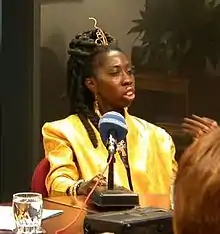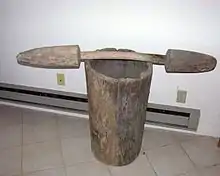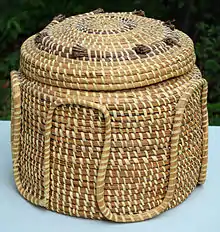Marquetta Goodwine
Marquetta L. Goodwine is an author, preservationist, and performance artist who serves as Queen Quet, Chieftess of the Gullah/Geechee Nation.

Goodwine is a native of St. Helena Island, South Carolina. She attended Fordham College at Lincoln Center and double majored in computer science and mathematics.[1] In 1996 she left Fordham and the founded of the Gullah/Geechee Sea Island Coalition.[1][2] In 1999 she became the first Gullah to speak before the United Nations, giving testimony at an April 1 hearing of the Commission on Human Rights in Switzerland.[3] She participated in the United Nations Forum on Minority Rights which was first established in 2008. At the forum, Queen Quet recorded the human rights struggle of the Gullah/Geechee people for archival by the United Nations.[4]
On 2 July 2002 Goodwine was elected and enstooled as "Queen Quet, chieftess of the Gullah/Geechee Nation."[1][5] Goodwine also serves as the Chair of the Gullah/Geechee Cultural Heritage Corridor General Management Plan and Expert Commissioner for South Carolina. She is a member of the 15-person commission established by the United States Gullah/Geechee Cultural Heritage Act which was passed by the United States Congress.
Goodwine is a public advocate for the Gullah/Geechee Sea Islands in the face of increasing storm damage resulting from the climate crisis[6] as well as ongoing flooding due to over-development and poor infrastructure maintenance.[7] Her work includes advocating and the preservation of Gullah/Geechee cultural traditions and resources that are threatened due to gentrification and climate change.[8]
Goodwine served as a consultant for the 2000 Mel Gibson film The Patriot, which featured scenes set on the South Carolina coast of the Gullah/Geechee Nation. She has been an advisor to several historic documentaries, including This Far by Faith: The African American Religious Experience, The Rise and Fall of Jim Crow, Slavery and the Making of America, Reconstruction: The Second Civil War, and The Will to Survive: The Story of the Gullah/Geechee Nation. She also lectures throughout the world.
She is the founder of a historic presentation troupe "De Gullah Cunneckshun," which has recorded several CDs and been featured on films and film soundtracks.[9][10]
Books
- Goodwine, Marquetta L. (1995). "St. Helena's Serenity." Gullah/Geechee: The Survival of Africa's Seed in the Winds of the Diaspora series v. 1. Brooklyn, NY: Kinship Publications.
- Goodwine, Marquetta L. (1997). Gawd dun smile pun we: Beaufort Isles. Gullah/Geechee the Survival of Africa's Seed in the Winds of the Diaspora series, v. 2. Brooklyn, New York: Kinship Publications.
- Goodwine, Marquetta L. (1999). Frum wi soul tuh de soil: The Cash Crops of the Sea Islands. Gullah/Geechee Africa's Seed in the Winds of the Diaspora series, v. 3. Brooklyn, New York: Kinship Publications.
- Goodwine, Marquetta L., and & the Clarity Press Gullah Project, eds (1998). The Legacy of Ibo Landing: Gullah Roots of African American Culture. Atlanta, Georgia: Clarity Press.
- Goodwine, Marquetta L., and Ronald Goodwine (1994). Brother and Sister... Heart to Heart (1994). Brooklyn, New York: Extended Kinship Appeal, Inc.
- Goodwine, Marquetta L. (2005). "365-66." Gullah/Geechee: The Survival of Africa's Seed in the Winds of the Diaspora series v. 4. St. Helena Island, SC: Kinship Publications.
- Goodwine, Marquetta L. (2006). "Chas'tun an e Islandts." Gullah/Geechee: The Survival of Africa's Seed in the Winds of the Diaspora series v. 1. Brooklyn, NY: Kinship Publications.
- Goodwine, Ronald "Kuumba", and Marquetta L. "Queen Quet" Goodwine (2004). T'inkin' 'bout Famlee: A Geechee Down Novella. St. Helena, South Carolina: Kinship Publications.
- Goodwine, Marquetta L. (2013). "Love's Sea Island Song" St. Helena Island, SC: Kinship Publications.
References
- Gosier, Chris (18 December 2020). "Marquetta L. Goodwine fights to preserve the culture of the Gullah/Geechee people and counteract the impact of climate change on their way of life". news.fordham.edu. Retrieved 24 January 2021.
- Hargrove, Melissa (2007). "WILL "THE FOOLS" ALWAYS LIVE OFF THE "DAMN FOOLS"? THE POLITICS OF "LOWCOUNTRY" TOURISM". Practicing Anthropology. 29 (3): 43–46. ISSN 0888-4552.
- "The Gullah Queen". African Soul. Archived from the original on 2001-04-05. Retrieved 2019-04-01.
- "Queen Quet". Smithsonian Conservation Commons. 2020. Retrieved 24 January 2021.
- Finney, Carolyn (2014). Black Faces, White Spaces: Reimagining the Relationship of African Americans to the Great Outdoors. University of North Carolina Press. p. 101. ISBN 9781469614496.
- Milman, Oliver (2019-10-23). "Gullah Geechee: distinct US culture risks losing island home to climate crisis". The Guardian. ISSN 0261-3077. Retrieved 2020-07-24.
- Voices, I. ❤ Climate (2020-06-23). "Survivors Recount Harrowing Battles Against Flooding". Medium. Retrieved 2020-07-25.
- Griner, Allison. "The Gullah Geechee's fight against 'cultural genocide'". www.aljazeera.com. Retrieved 2020-07-25.
- Sarah Welch, Sarah; Cook, Issac (1 November 2011). "Guilford experiences De Gullah Cunneckshun". The Guilford. Retrieved 24 January 2021.
- "De Gullah Cunneckshun". Gullah/Geechee Nation. Retrieved 24 January 2021.
External links
- "Gullah/Geechee Nation.
- "Disya Who WEBE!", Gullah/Geechee Nation.
- Gullah Geechee Angel Network.
- "Marquetta Goodwine: Queen of the Gullah Geechee Nation, from The African Soul site.
- "Queen Quet, Head-of-State for the Gullah/Geechee Nation.
- Marquetta Goodwine on LinkedIn
- Gullah/Geechee Sea Island Coalition

